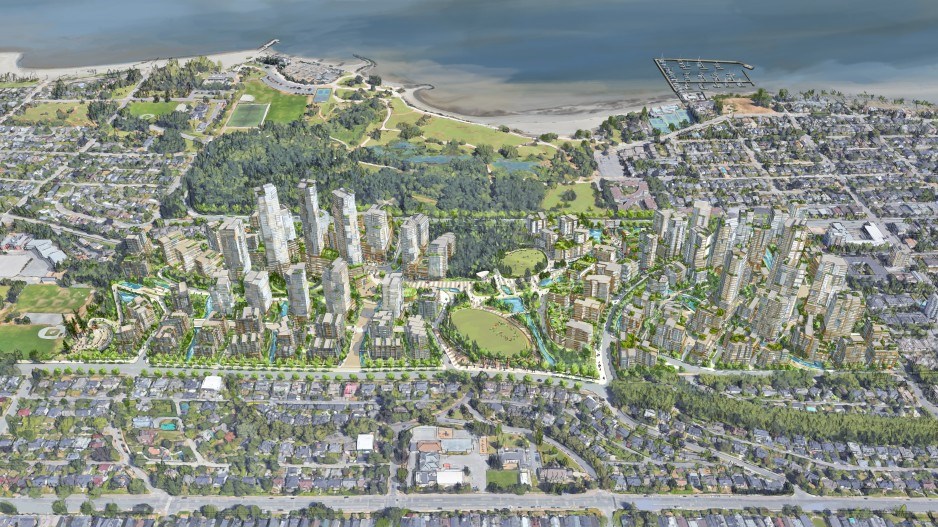The 90-acre Jericho site is the largest housing development in Vancouver’s history.
This is an opportunity to create a liveable showcase in city-making for future generations.
As an urban planner and developer, I am in favour of urban density on the Jericho Lands and have no problem with modest high-rise buildings as an urban form.
However, the latest MST Development Corp. plan for Jericho to be presented to city council on Jan. 24 completely fails to address the key issues of liveable density, the need for more rental housing supply and housing affordability.
These are the three key issues that matter most to the people of Vancouver, where we all live, work, and play together.
So what is MST proposing?
Density
MST, the private developer of Jericho, has almost doubled the proposed density since 2021 from 2.0 FSR (floor space ratio) in its initial plan to an outrageous 3.5 FSR, with 60 high-rise towers of up to 49 storeys.
Housing 28,000 people, this is three times higher than the density of urban Hong Kong, twice as high as Oakridge Park and higher than the West End.
Presumably, this increase in FSR is in response to the call for more housing supply to address Vancouver’s affordability crisis.
If the proposed development included assurances of affordable housing for middle-income Vancouverites, this might be laudable, but very few of the proposed units will actually be affordable.
There are also serious infrastructure issues associated with the kind of density proposed at Jericho, which seems to resemble Burnaby’s Metrotown. No one wants to see another Metrotown at Jericho.
Traffic flows, community amenities and whether the underlying hydrological capabilities can even support so much density, have not yet been adequately addressed by the developer.
A city-wide survey by Forum Research in October found that more than 70 per cent of Vancouver residents disapprove of Jericho’s tower heights and population density.
MST has failed to listen to the density concerns of Vancouverites.
Rental Housing Supply
The developer has the opportunity to address Vancouver’s severe rental supply shortage through its insistence that MST maintain title in perpetuity. However, instead of producing more rental apartments, MST plans to market 70 per cent of the housing as long-term strata leaseholds.
Given the fabulous views from those 49 storey towers, and in the absence of any news to the contrary, it’s fair to assume the plan is to market these units to international buyers at luxurious prices that few locals can afford.
Of the 30 per cent rental housing, 20 per cent is to be allocated for lower-income social housing, and only one quarter of the remaining 10 per cent purpose-built rental housing is to be allocated for below-market moderate incomes.
Vancouver has the unenviable title of having the highest rents in Canada. There is simply not enough purpose-built rental housing supply in Vancouver to meet the unprecedented demand.
The proposed development fails to provide a broad range of rental housing for Vancouverites.
Housing Affordability
Given the immensity of the development, MST has the opportunity to address the issue of housing attainability for middle-income earners, particularly because the federal government’s wholly owned Canada Lands Corporation is a one-third partner on the Jericho Lands.
No one is arguing with MST’s goal to use this development to secure the economic future for its First Nation partners. But surely on such a huge once-in-a-lifetime development there can be a balance between profit and meeting the needs of Vancouver’s citizens and the city at large.
The nearby Lelem Village housing development by the Musqueam First Nation does just that at a reasonable density of 1.5 FSR that respects the land and the community, at less than half the density of Jericho.
Lelem Village
The feds have repeatedly stated that public lands should be used for the public good to provide much-needed housing that’s affordable for Canadian employment incomes.
The developers bought the land eight and 10 years ago from the federal and provincial governments at a relatively low land cost of $7.88M per acre. By comparison, Cambie corridor lands sold for $38M per acre last year. And the Burrard Street St. Paul’s hospital site sold for $45M per acre three years ago.
Given the low land cost, the developer has the opportunity and financial flexibility to provide at least 50 per cent of the housing to be affordable and attainable for local moderate-income earners in Vancouver, even at a density of 2.0 FSR.
Even the developer’s promises of 30 per cent affordable housing are somewhat disingenuous, because of an “escape hatch” written into MST’s 178-page policy statement.
In one section, MST’s claim to provide below-market housing is dependent on additional funding from senior governments. This is not the norm. Most City of Vancouver rezonings that require a percentage of affordable housing are secured unconditionally through a housing agreement with the developer, without the condition of additional taxpayer funding and without an “escape hatch.”
Who is Jericho being built for? Locals or the international set? Who will be living there?
The development fails to provide housing that is affordable for Vancouver’s middle-income earners.
The Opportunity
Jericho is Vancouver’s once-in-a-lifetime opportunity for visionary city building on such a massive site. Let’s not blow it with a premature plan that has not addressed Vancouver’s vital housing needs for rental housing and affordable housing at a liveable density.
The Jericho Coalition – a group of architects, planners and engineers – has prepared an alternative plan at JerichoCoalition.org that is less dense (2.0 FSR), a more liveable built form, and more affordable.
I trust that city council will defer the Jericho plans and policy statement for further consideration by staff and other stakeholders, in order to review the housing issues of residential density, lack of rental supply and housing affordability.
Arny Wise is an urban planner and retired developer.



